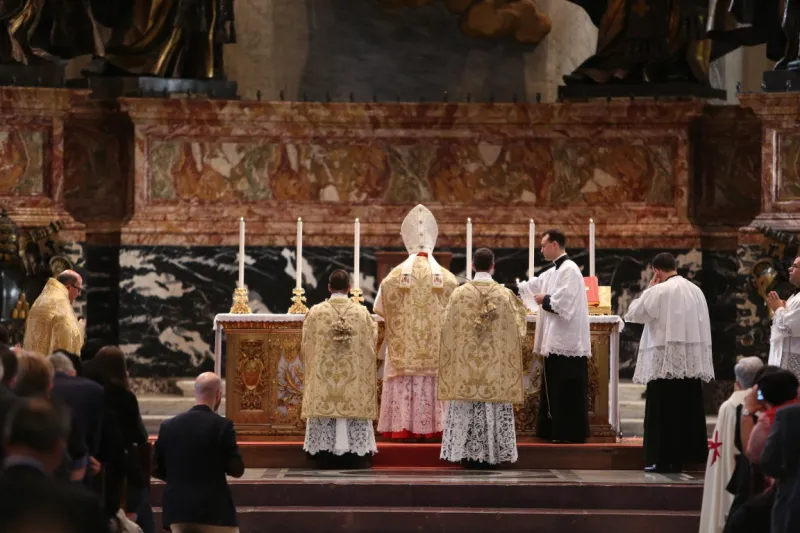
Washington D.C., Jul 31, 2021 / 14:30 pm (CNA).
The organizers of an Aug. 14 Tridentine Mass in Washington, D.C. – canceled per new papal restrictions on traditional liturgies – are asking the Archbishop of Washington to reinstate the Mass.
On Tuesday evening, CNA reported that a solemn pontifical Mass scheduled for Aug. 14 at the Basilica of the National Shrine of the Immaculate Conception in Washington, D.C. had been cancelled, after Cardinal Wilton Gregory of Washington withdrew his permission for the Mass.
On July 29, the Paulus Institute, which organized the Mass, wrote to Cardinal Gregory asking him to reinstate the scheduled Mass by Monday, Aug. 2, “in the interests of the unity of the universal Church.”
“The cancellation of the Mass, so long planned and prepared, is a violation of fundamental justice, because it is an arbitrary action not motivated by any urgency,” the group stated. “The Catholic faithful should not be subjected to penalties for unused travel reservations caused by an unworthy cancellation of the Mass.”
The Archdiocese of Washington did not immediately respond to CNA’s request for comment on Saturday afternoon.
According to the institute, Cardinal Gregory’s decision to rescind his permission for the Mass was per the pope’s new motu proprio restricting traditional liturgies, Traditionis custodes. Archbishop Thomas Gullickson, the retired papal nuncio to Switzerland, was to celebrate the Mass.
Regarding the request to Gregory to reinstate the Mass, Archbishop Gullickson “has reviewed this letter and has agreed,” the Paulus Institute said on July 29.
A pontifical Mass is celebrated by a bishop in the extraordinary form of the Roman Rite. The Mass at the National Shrine was scheduled for the vigil of the Solemnity of the Assumption, and was to be broadcast by EWTN.
Traditionis custodes, issued on July 16 and effective immediately, recognized the “exclusive competence” of bishops to authorize the Traditional Latin Mass in their respective dioceses. Bishops are to determine places in their dioceses where the faithful may gather for the Latin Mass – but the locations may not be parochial churches, the document stated.
In a July 16 letter to priests following the release of the document, Cardinal Gregory said he would “prayerfully reflect” on the pope’s letter “in the coming weeks,” in order “to ensure we understand fully the Holy Father’s intentions and consider carefully how they are realized in the Archdiocese of Washington.”
“In the interim, I hereby grant the faculty to those who celebrate the Mass using the liturgical books issued before 1970 to continue to do so this weekend and in the days to come, until further guidance is forthcoming,” he stated.
Bishops around the United States have responded to the motu proprio in the last two weeks, with many of them granting temporary permission for priests who already celebrate the Traditional Latin Mass to continue doing so. Some bishops have granted canonical dispensations for parish churches from the papal restrictions on Latin Mass locations.
On July 27, the Paulus Institute reported that Cardinal Gregory’s permission for the Tridentine Mass at the National Shrine had been withdrawn per Traditionis custodes.
Although the Basilica of the National Shrine of the Immaculate Conception is located within the territorial bounds of the Archdiocese of Washington, it is not a diocesan church. Archbishop Wilton Gregory, as Washington archbishop, is ex officio chairman of the shrine’s board of directors.
Pope Francis’ letter accompanying his motu proprio stated that liberalizations in the use of the Traditional Latin Mass had been “exploited” to promote disunity within the Church.
“I am nonetheless saddened that the instrumental use of Missale Romanum of 1962 is often characterized by a rejection not only of the liturgical reform, but of the Vatican Council II itself, claiming, with unfounded and unsustainable assertions, that it betrayed the Tradition and the ‘true Church’,” Pope Francis wrote.
In its July 29 letter, the Paulus Institute – which had organized previous pontifical Masses in 2010 and 2018 at the shrine – denied that such division had been a part of the celebrations.
“None of the allegations of disunity and division presented in Traditionis Custodes and in the accompanying letter to bishops can rightfully be said to apply to this pontifical Mass,” the letter stated.
Citing the Second Vatican Council’s constitution on the sacred liturgy Sacrosanctum Concilium, the institute said that “the Usus Antiquior, is a millennial treasure of the sacred Deposit of the Faith—and as such is a right enjoyed by entitlement by the Catholic faithful.
If you value the news and views Catholic World Report provides, please consider donating to support our efforts. Your contribution will help us continue to make CWR available to all readers worldwide for free, without a subscription. Thank you for your generosity!
Click here for more information on donating to CWR. Click here to sign up for our newsletter.





Interesting development.
Never heard of the Paulus Institute but now I have.
Hmh.
Has Cardinal Gregory suddenly forgotten that indisputable tenet of leftism, that diversity is our strength?
And, it just me, or does this seem like another undemocratic dictat from an out-of-touch patriarchal hierarchy?
I guess it just comes down to the fact that persecuting people over something as abstruse as a liturgical form doesn’t seem all that tolerant and open-minded to me. And we *know* that Cardinal Gregory and his devoutly Catholic fellow politicos in DC are *infinitely* tolerant and open-minded.
If they weren’t, they wouldn’t constantly be claiming that they are, after all. Would they?
Francis condemns anyone being anti-Vatican ll. Yet what is quoted here from the Council on respect for Ancient Rites, and what Sacrosanctum Concilium says about the language of the Mass is in Latin with only some vernacular, if any, be permitted. It seems Francis is an anti-Vatican ll extremist. A man of a thousand contradictions. May God have great mercy on Francis.